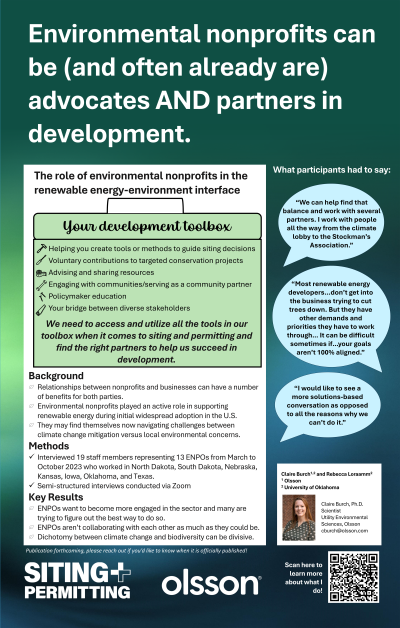The role of environmental non-profits in the renewable energy-environment interface
Tuesday, April 15, 2025
5:00 PM - 6:00 PM PT
Location: Regency Ballroom


Claire Burch, PhD
Scientist
Olsson
Oklahoma City, Oklahoma
Poster Presenter(s)
Presentation Description: Nonprofits are becoming increasingly important actors in business-government interactions as well as broader business interactions with society. They can serve a number of different roles, including building bridges between stakeholders, lending legitimacy to concerns or to other organizations, or monitoring problem-solving performances of businesses. Within this context, my research focused on a specific sub-set of non-profits, environmental non-profits (ENPOs). These organizations work on a range of scales, from focusing on small scale or local changes to environmental quality or addressing local environmental challenges to pushing policy implementation at the state or federal level. ENPOs played an active role in promoting the deployment of renewable energy development as early as the 1970s, but ENPOs now find themselves confronted with a disconnect in priorities. Many of these organizations are now trying to balance the climate mitigation benefits of renewable energy deployment with potential local environmental concerns. ENPOs represent a dichotomy for the industry - they can be some of the biggest advocates for deployment, but they can also represent project opponents in specific contexts. Understanding the current relationship between ENPOs and the developers offers an opportunity to build better lines of communication with this group of stakeholders, find avenues for collaboration, and overall reduce conflict with ENPOs in many contexts. In my research, I interviewed 19 staff members representing 13 ENPOs which operate in the Great Plains region. On a panel, I could share the feedback I received from these participants on:
- Their experiences working with developers
- The roles they currently play in development and the roles they could play
- Their perspective on the environmental frameworks that exist for development
- Their thoughts on current conflict with developers
- The challenges and opportunities they see in development
